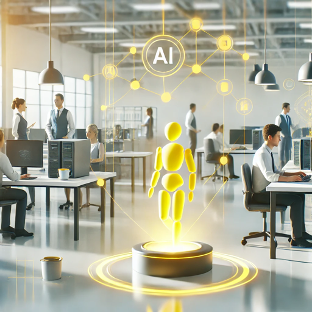AI’s Impact on Workforce Dynamics
Will AI replace jobs? Explore AI’s impact on workforce dynamics and how businesses can adapt.

AI and workforce dynamics are a hot topic. With the rise of automation and artificial intelligence, concerns about job displacement continue to grow. However, AI is not just about replacing jobs, it is also creating new opportunities for skilled professionals. In this blog, Jackie Martinez, CEO of Anima Automation, provides insights on how businesses and employees can navigate this evolving landscape.
The Truth About AI and Job Displacement
There is a widespread fear that AI will replace human jobs, leaving many without employment. While automation does streamline certain repetitive tasks, it also paves the way for new job roles that focus on higher-level thinking and creativity.
AI impacts the workforce in several ways:
· Eliminating Repetitive Tasks: AI automates routine activities, allowing employees to focus on more strategic initiatives.
· Creating New Job Roles: AI introduces new roles in data science, AI ethics, machine learning, and automation engineering.
· Enhancing Workplace Efficiency: AI-powered tools optimize productivity by assisting employees rather than replacing them.
Businesses that embrace AI as a collaborator rather than a competitor will find ways to upskill employees and integrate AI effectively into their workforce.
The Rise of AI-Augmented Roles
Rather than eliminating jobs, AI is transforming them. Many professions are evolving as AI takes over manual tasks and allows employees to focus on innovation, strategy, and problem-solving. Examples of AI-augmented roles include:
· AI-Assisted Customer Service Representatives: AI chatbots handle common queries, while human agents handle more complex issues.
· Automated Sales Assistants: AI tools manage lead generation, freeing up sales teams to build stronger client relationships.
· Healthcare AI Support Staff: AI aids doctors by analyzing medical data and providing diagnostic support.
By adapting to AI-driven changes, businesses can create opportunities for employees to take on more meaningful and impactful roles.
Overcoming Fear of Automation in the Workforce
The fear of job displacement is real, but businesses and employees can take proactive steps to mitigate concerns and embrace AI positively.
Strategies to overcome automation fears include:
· Upskilling and Reskilling Programs: Companies should invest in training programs to help employees transition into AI-related roles.
· Encouraging Human-AI Collaboration: AI should complement human intelligence, not replace it.
· Creating Policies for Ethical AI Use: Implementing guidelines for AI in the workplace ensures fairness and transparency.
AI is not an adversary but an opportunity for growth. Businesses that support continuous learning and adaptation will see a positive impact on workforce morale and productivity.
How Anima Automation is Helping Businesses Adapt
Anima Automation works with businesses to implement AI solutions that enhance workforce productivity without eliminating jobs. The company focuses on:
· Process Automation: AI streamlines repetitive tasks, allowing employees to focus on high-value work.
· AI-Powered Workforce Training: Helping businesses train employees in AI-related roles and responsibilities.
· Optimizing AI-Human Collaboration: Ensuring AI solutions are used to assist, not replace, employees.
Through tailored automation strategies, Anima Automation ensures that businesses can leverage AI while maintaining a strong and engaged workforce.
Conclusion
AI’s impact on workforce dynamics is undeniable, but it does not have to be a threat. Instead of fearing automation, businesses and employees should focus on leveraging AI to enhance productivity and create new opportunities. Learn more about AI’s role in the workforce by listening to the full podcast episode on The Shy Marketing Pocast.



